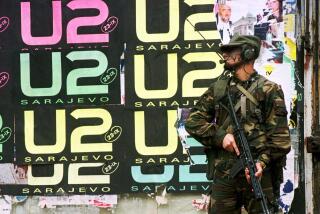Mediators Bring Together Bosnia Foes in Sarajevo
- Share via
SARAJEVO, Bosnia-Herzegovina — Struggling to prevent a violent exodus of Bosnian Serbs from the nearby suburbs they control, international mediators Wednesday brought together Serb and Muslim-Croat government officials in this capital for the first time since the war began more than 3 1/2 years ago.
The unprecedented meeting came a day after an antitank rocket, fired from one of those Serb-held suburbs, slammed into a crowded streetcar in the center of Sarajevo, killing one person, injuring nearly 20 others and eroding the confidence of some Bosnians in their NATO peacekeepers.
And even as the officials met for three hours, hundreds of Serbs could be seen loading trucks with furniture, appliances and, in one case, a kitchen sink as they prepared to flee districts around Sarajevo that will revert to government control under the U.S.-brokered Bosnia peace plan.
The new violence and threats of more have apparently discouraged the White House from including Sarajevo on President Clinton’s itinerary when he visits Bosnia-Herzegovina this weekend, government officials here said.
In Vogosca, a Serbian suburb about six miles north of Sarajevo, moving trucks lined the main residential road Wednesday, and entire families were packing.
“After 3 1/2 years of war, we cannot live together,” said Mile, a 22-year-old Bosnian Serb police officer. “The only thing I can trust is a divided city.”
Mile, who did not want his last name published, was joined by relatives who hauled a sofa, carpets and appliances onto the cracked sidewalk. A 5-year-old contributed his sled.
Serbs fear reprisals from a Muslim-led government and its followers who withstood the Bosnian Serb siege of Sarajevo, and they are threatening to leave en masse, burning their houses behind them.
Because such violence would wreck the peace process, the senior civilian administrator of the peace agreement, Swedish diplomat Carl Bildt, convened leaders of the Sarajevo Serbs and Sarajevo Muslim and Croat officials for a first meeting of the two sides inside the capital. Earlier meetings on technical and military matters have been held at the airport outside Sarajevo, a “neutral” facility under U.N. control that formed the borderline between government and Serbian territory.
It was the first time a Bosnian Serb official has publicly visited Sarajevo since the war started.
“I am pleased after four years to be back in the city, and I am not afraid,” said Maksim Stanisic, president of the executive board of “Serbian Sarajevo,” as he emerged a little wide-eyed from the meeting.
Bildt said he was trying to treat Sarajevo as one city so the different sides become accustomed to the idea of a united capital. He cautioned against expecting too much from the initial contacts, but he welcomed the government’s decision to proclaim amnesty for most soldiers.
“Amnesty . . . goes a long way toward meeting some of the [Serbs’] concerns,” Bildt told reporters.
Following weeks of emotional internal debate, the government finally agreed late Tuesday to give amnesty to enemy soldiers--as well as deserters from its own army--as long as they are not guilty of war crimes as defined by the U.N. war crimes tribunal.
The government had resisted granting amnesty, claiming the measure would anger and alienate government supporters who fought the Serbs. Even with amnesty, many Serbs--such as Mile, the man from Vogosca--say they do not trust the government of President Alija Izetbegovic to fairly administer it.
Meanwhile, U.S. Adm. Leighton W. Smith, commander of North Atlantic Treaty Organization’s peacekeeping force in Bosnia, traveled to Belgrade to enlist the support of President Slobodan Milosevic of neighboring Serbia in stopping additional assaults like Tuesday’s attack on the Sarajevo streetcar.
“The president agrees with me 100% that this was a heinous act, an act of a terrorist, an act of an individual who himself or herself was trying to do damage to the [Bosnian] peace agreement,” Smith told reporters.
As Smith spoke, his representatives in Sarajevo sought to downplay the attack--caused by a 64-millimeter light antitank rocket fired from a high-rise apartment building in Grbavica, a Serb-held district of the city--as an isolated act of common crime.
Lt. Col. Mark Rayner, spokesman for NATO’s Implementation Force, or IFOR, argued that the rocket attack was a police matter and not a job for NATO because NATO “cannot saturate every street” to protect Bosnian citizens.
“If it was [committed by] a formed body like an army, it would be an IFOR matter,” he said. Instead, “it is a civil matter.”
NATO’s argument--that the attack was the isolated work of a rogue gunman--rang hollow for many Bosnians. Grbavica is one of the most strictly controlled Serbian suburbs, with a large paramilitary presence; where other suburbs have begun to permit outsiders, access to Grbavica remains heavily restricted.
Furthermore, IFOR made its conclusion before an investigation was conducted, dismissing out of hand that the use of an antitank rocket on a city streetcar might be a deliberate, sanctioned act by Serbs who are refusing to cede control of their hometowns.
Although French troops from IFOR returned fire quickly after spotting at a distance the origin of the rocket, which initial reports had identified as a grenade, questions were raised about the ensuing investigation.
They launched a search of the apartment building where the rocket originated, but not until 90 minutes after the attack, said spokesman Col. Richard Pernod. The French officers waited for a Bosnian Serb liaison officer before beginning.
At that point, they searched the multistory building--but included only apartments that were empty.
“We do not have the right [to enter apartments], because we are not a police force,” Pernod said. No suspects were apprehended.
More to Read
Sign up for Essential California
The most important California stories and recommendations in your inbox every morning.
You may occasionally receive promotional content from the Los Angeles Times.














